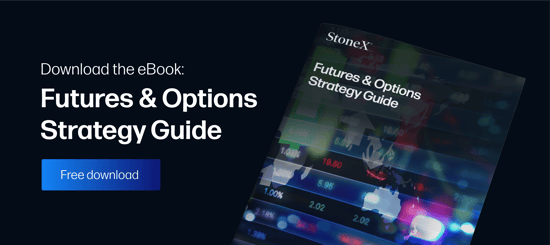Futures contracts, including trading in crude oil futures, are financial instruments that carry with them legally binding obligations. Buyer and seller have the obligation to take or make delivery of an underlying instrument at a specified settlement date in the future. Oil futures are part of the derivatives family of financial products as their value “derives” from the underlying instrument. These contracts are standardized in terms of quality, quantity and settlement dates.
About NYMEX, ICE, and WTI
There are futures markets for a number of instruments ranging across currencies, bonds, equities, interest rates, and commodities. In the case of crude oil, the main futures exchanges are the New York Mercantile Exchange (NYMEX) and the Intercontinental Exchange (ICE), where West Texas Intermediate (WTI) and North Sea Brent crude oil are traded, respectively.
These exchanges trade what is referred to as “light-sweet” crude oil, and a single contract – also known as a “lot” – calls for the purchase or sale of 1,000 barrels of oil. Traders can buy and sell oil for delivery several months or years ahead.
The bulk of activity in commodity futures markets is typically concentrated on oil for delivery in the next three months. However, in the past five years, activity has increased substantially for deliveries much further into the future as more investors put money into commodity indices.
How Are Oil Futures Traded?
Futures contracts are traded on regulated futures exchanges. Trading can take place through electronic dealing systems, open outcry around a pit, or a combination of both. To trade on an exchange, you need to be a member of that exchange. Exchange members can trade on their own account, or they can execute orders for hedgers or speculators. In the latter case, exchange members are acting as brokers and will collect a fee for their service. Each futures exchange has a clearing house which ensures that trades are settled in accordance with market rules, and that guarantees the performance of the contracts traded.
The Role of Clearing Houses
The NYMEX operates its own clearing house. In the UK, the London Clearing House (LCH.Clearnet) is a recognized house that clears business for many different exchanges. The ICE exchange is also recognized as a clearing house by the UK regulator, the Financial Services Authority (FSA).
In the US, the equivalent government regulator is the Commodity Futures Trading Commission (CFTC). When a buyer and a seller agree to trade on futures exchanges, their transaction is recorded. The clearing house then steps in between them, in effect breaking the “bond” between the buyer and the seller to become counterparty to both sides. The process of creating a trade by the name of the clearing house to each of the parties is often referred to as “novation”. p>
The clearing house, among other roles, is responsible for the management of the risk on transactions on the exchange. It establishes margin levels, default rules, and ensures the settling of individual positions.
When market participants buy futures, they do not pay the full amount of value of the contracts they purchase. Rather, they pay an initial margin that acts like an insurance deposit, the amount of which is determined by the clearing house.
This initial margin represents a percentage of the value of the transaction. At the end of each trading day, individual positions are evaluated relative to the closing price of the market published by the exchange. Participants are then said to be “marked to market”.
If their position is profitable, it will accrue into their account. In contrast, if the position is not profitable, the loss will be deducted from the initial deposit, and the participant will be given a “margin call” – also known as the variation or maintenance margin – to make up the difference.
On the settlement date, or the expiry of a futures contract, the buyer and seller have the obligation to make or take delivery of the instrument. In the case of oil, settlement can be carried out in two ways: through the actual delivery of oil into a predefined location or through a cash settlement.
In the case of the NYMEX WTI contract, physical delivery is possible and entails delivery into the oil hub of Cushing, Oklahoma. On the ICE Brent contract, there is no physical delivery, but a cash settlement is available. The value of the position is assessed relative to the settlement price and a corresponding financial payment is made.
In reality, physical delivery rarely takes place in commodity futures. At the same time, market participants do not necessarily need to wait for the expiry of their contract to settle their obligation vis-à-vis the exchange.
Positions are often closed by taking an offsetting position for an equal and opposite amount of contracts. For example, a buyer of certain futures can therefore sell an-equal amount of that futures, making their net obligation relative to the exchange zero.
Crude Oil Futures Definition
The world’s most actively traded commodity is crude oil, which is unrefined oil that is a popular source of energy and energy-related products. Contracts on many different types of oil are traded on exchanges throughout the world. In the United States, the New York Mercantile Exchange (NYMEX) is the major trading exchange for crude oil futures contracts. In the United Kingdom, the major trading venue is the International Petroleum Exchange.
Light-sweet crude oil is preferred by refiners because of its ability to yield high levels of gasoline, diesel fuel, heating oil, and jet fuel. Other trading exchanges throughout the world also trade futures and options on many varieties of crude oil. The benchmark light-sweet crude oil contract that NYMEX bases its contract on is the West Texas Intermediate (WTI) crude oil that is delivered in Midland, Texas.
Cash prices for WTI are quoted at Cushing, Oklahoma, which is a major crude oil shipment point that has extensive pipeline connections to oil producing areas and the Southwest and Gulf Coast-based refining centers.
